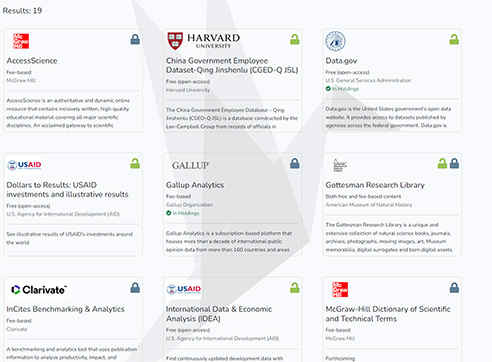There is a glaring omission in the mosaic of scholarly information sources. Paratext has heeded the call.
Libraries spend millions each year providing access to web-based research databases, from PsycInfo and Foreign Trade Statistics to the Digital Archives of Medieval Culture.
But where does one see them all? Who produces them? Are they Open Access or fee-based? Do these have identifiable research value?
Most important of all, how much time is required for all of this?
bird is a new, ongoing initiative, created by research librarians, to identify and catalog the universe of web-based research databases found in academic libraries.
For subject specialists and collection staff a major issue is simply having enough time to stay abreast of all the content available to meet user needs. bird answers:
bird is customized to each library's database holdings. bird allows you to assess how your current collection matches with all known resources.
Furthermore, each library has a customized portal to refine your profile whenever you choose, requiring no additional tech support. It’s point and click.
Editorial analysis of bird: Base Inventory of Research Databases began in 2021. After deduplicating, normalizing, and removing out-of-scope titles from our initial lists, the bird founding team identified approximately 8,000+ unique research database titles.
The editorial team is continually engaged in discovering new titles; titles that are available but no longer updated; as well as titles that have ceased publication.
The content within bird reflects U.S. academic interests. The number of titles by academic disciplines show the popularity of career-focused departments (such as business/economics, engineering, medicine, public health, law, and nursing), as well as the demand for liberal arts and social science materials.
The bird editorial team established the following guidelines for the inclusion of a title in bird. A database:

Diane H. Smith, Project Director, MLS, MBA
Associate University Librarian for Research and Educational Services, George Mason University; VP, Product Management, ProQuest; VP, Product Development and Management, LexisNexis; Chief, Reference and Instructional Services, Pennsylvania State University.
Erica Swenson Danowitz, EdD, MLS, MA
Reference Librarian and former Professor, Delaware County Community College.
Stacey Marien, MSLS, MBA
Librarian Emerita, American University; Business Librarian and Acquisitions Librarian; Business Librarian, Elon College (now University.)
Sue Miller, MSLS, BS, Management Engineering
Independent Librarian in reference and research; engineer in industry and distribution.
Helen M. Sheehy, MLIS
Associate Librarian Emerita, Pennsylvania State University; Head of Social Sciences and Maps Library.
Christine Carlson Whittington, MSLS, MA
Former Library Director, James Addison Jones Library, Greensboro College; Head of Arts Library, Pattee Library, Pennsylvania State University; Head of Reference, Fogler Library, University of Maine.